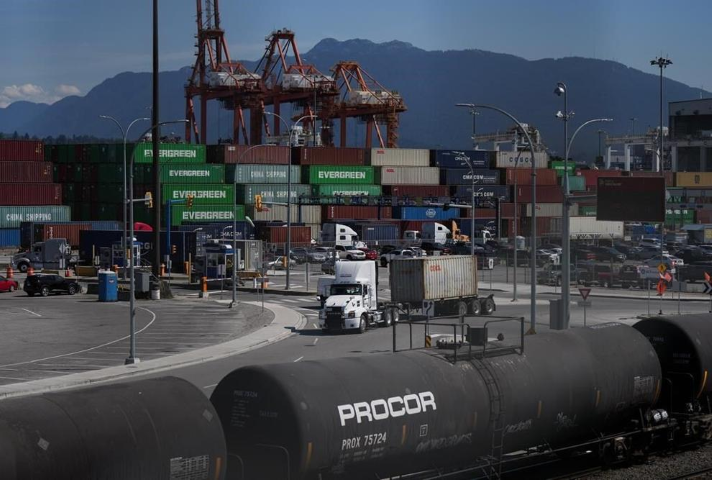
Transport trucks carry cargo containers at port in Vancouver, on Friday, July 14, 2023. THE CANADIAN PRESS/Darryl Dyck
The Vancouver Fraser Port Authority's CEO, Peter Xotta, anticipates an increase in cargo traffic at the Port of Vancouver due to recent attacks on cargo vessels in the Red Sea. These attacks, attributed to Iran-backed Houthi militants, have prompted shippers to seek alternative routes, potentially leading to a surge in cargo shipments to Vancouver.
Xotta mentioned that the ongoing conflict in the Red Sea region has caused significant rerouting of cargo ships, impacting global trade routes. This has resulted in a notable increase in cargo volumes at the Port of Vancouver in early 2024, although the long-term implications remain uncertain.
The attacks in the Red Sea have compelled many vessels to avoid the area and opt for alternative routes, including circumnavigating Africa, to reach their destinations. This has extended voyage durations by several weeks, affecting the efficiency and cost-effectiveness of supply chains.
The recent strike on the bulk carrier True Confidence, which resulted in the loss of three civilian lives, underscores the severity of the situation. Militants have targeted ships associated with Israel, the U.S., or the U.K., further exacerbating concerns about maritime security in the region.
To avoid the Red Sea route, some cargo vessels have chosen to travel eastward across the Pacific Ocean to North America from Asia. This decision, while providing a safer alternative, has implications for global trade dynamics and supply chain operations.
Xotta emphasized the importance of stability in supply chains, highlighting the need for reliable trade routes to ensure the smooth flow of goods. Despite challenges posed by geopolitical tensions and security risks, maintaining stable and efficient trade corridors remains a priority for the Port of Vancouver and the broader maritime industry.
In 2023, the Port of Vancouver experienced a record-high volume of cargo traffic, with over 150.4 million tonnes of goods passing through its docks. This marked a six percent increase from the previous year, driven primarily by bulk exports such as wheat, canola, and petroleum.
While bulk exports saw significant growth, container shipments experienced a decline, attributed to factors such as overstocked retail inventories and reduced consumer demand. However, container exports, particularly those containing wood pulp and specialty crops, partially offset this decline.
Xotta noted that the COVID-19 pandemic influenced consumer spending patterns, with a shift towards services rather than goods. This shift, coupled with rising living costs, impacted the demand for imported household products, resulting in a decrease in container shipments.
Despite challenges such as the pandemic and labor strikes, the Port of Vancouver managed to maintain strong export performance, thanks to its diverse range of shipment types and trading partners. The port's resilience underscores its importance as a key player in global trade networks.
Looking ahead, Xotta expressed optimism about the port's prospects for recovery and growth, expecting a rebound in trade activities in 2024 and beyond. However, uncertainties surrounding geopolitical tensions and trade routes underscore the need for vigilance and adaptive strategies in the maritime industry.















